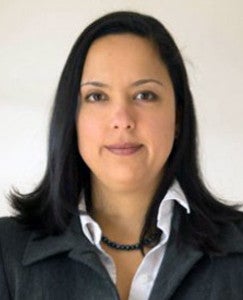 Assistant Professor
Assistant Professor
Department of Environmental & Occupational Health Sciences
University of Washington School of Public Health
dmco25@uw.edu.
Dr. Ceballos strives to better understand the connection between exposure to hazards in the workplace, the community, and in the home, where workers may unwittingly bring home pollutants and transfer hazards to their children. She earned a Master’s degree in atmospheric chemistry and a PhD in Environmental and Occupational Hygiene. She is also a board certified industrial hygienist. She became a JPB Environmental Health Government Fellow in 2014 because she worked at the National Institute for Occupational Safety and Health (NIOSH) as an Industrial Hygienist conducting health hazard evaluations and providing industrial hygiene technical and consultative assistance to Federal, State, and local agencies, labor, industry, and other groups or individuals to control occupational health hazards and to prevent related trauma and diseases. Dr. Ceballos became a Harvard Chan visiting scientist from 2015 to 2016 and a research scientist since 2017. She is also an instructor in three Harvard Chan graduate courses.
Research Expertise
Dr. Ceballos is interested in occupational health and safety research related to exposure assessment, field sampling and analysis, workplace interventions, best practices, risk communication, and outreach. She has been particularly interested in multiple chemical exposures, dermal protection, green industries, and occupational health disparities. Her exposure science expertise and passion for diversity provides her with a privileged position to work with other scientists around the nation through the JPB fellowship to solve problems related to occupational health of underserved populations.
Fellowship Project: Assessing the Role of Occupation on Home Exposures in a Disadvantaged Community. Being an immigrant, low English proficiency, and low levels of education have been associated with higher rates of injuries among minorities. Minority workers may also have a higher likelihood to hold the so-called “dirty jobs,” being exposed to chemicals at work, and transporting chemicals home from work, known as “take home.” Further, health disparities could exacerbate how work interplays with exposures at home and how it ultimately affects health. This study aimed to better understand the connection between home and work-related exposures in a high-risk community by identifying occupation-specific sources of home exposure. Ceballos’ team assessed the relationship between home and potential for take home with a survey and environmental sampling for metals and semi volatile compounds (SVOCs) including polychlorinated biphenyls (PCBs). Participants and household members were referred to the Massachusetts Department of Public Health (MDPH) Biomonitoring Massachusetts Study for biomonitoring of metals and PCBs to verify take home. Dr. Ceballos worked with the Massachusetts Coalition for Occupational Safety & Health (MassCOSH) to train participants on ways to mitigate these exposures. This project was also funded by CRESSH
This information is accurate as of the fellowship year indicated for each fellow.